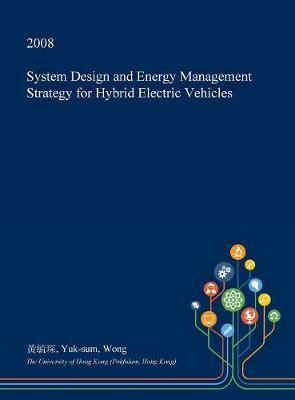Overview
This dissertation, System Design and Energy Management Strategy for Hybrid Electric Vehicles by 黃毓琛, Yuk-sum, Wong, was obtained from The University of Hong Kong (Pokfulam, Hong Kong) and is being sold pursuant to Creative Commons: Attribution 3.0 Hong Kong License. The content of this dissertation has not been altered in any way. We have altered the formatting in order to facilitate the ease of printing and reading of the dissertation. All rights not granted by the above license are retained by the author. Abstract: Abstract of thesis entitled System Design And Energy Management Strategy For Hybrid Electric Vehicles Submitted by WONG, Yuk Sum for the degree of Doctor of Philosophy at The University of Hong Kong in January 2008 The hybrid electric vehicle (HEV) system has a complex architecture that contains multidisciplinary technologies. Since HEV performances can be affected by many multidisciplinary interrelated factors, design optimisation should be carried out in system level in which there are many tradeoffs among various subsystem criteria. This project, firstly, aims to develop a HEV simulator to evaluate HEV performances. Secondly, it aims to review all prominent HEV architectures and propose the most efficient energy management system for different types of HEVs. Thirdly, a new optimisation scheme is proposed to determine the parameters of the powertrain in a HEV. Different interactions among HEV subsystems are analysed to develop a HEV performance simulator. This simulator not only evaluates vehicle performances, but also optimises the powertrain parameters for HEVs. This simulator samples the continuous behaviour of a vehicle as a series of discrete steps. Efficiency tables are used to relate the power and torque transmission between the components at each time step. I All the HEV architectures, namely series hybrid, parallel hybrid, series- parallel hybrid, plug-in series hybrid and plug-in series parallel hybrid, are reviewed. In all these HEV architectures, acceleration performance and fuel economy depend heavily on the power ratings of the electric motors and the batteries, while the driving range depends heavily on power ratings of the internal combustion engines (ICEs) and the capacity of the gas tanks. Therefore, the energy management systems between the electrical powertrain and the ICE powertrain should be optimized in system level. System level optimisations are performed by the simulator. The sensitivities of battery masses and ICE power capacities to vehicular performances are analysed. Based on the simulation results, powertrain design topology is identified. In addition, an optimisation scheme is proposed for determining the optimal gas tank capacity and motor power by considering the targeted driving range and acceleration performance in a limited batteries and ICE power. II DOI: 10.5353/th_b3955885 Subjects: Hybrid electric vehiclesElectric vehicles - PerformanceElectric vehicles - Energy consumptionAutomobiles - Fuel systems - Design
Full Product Details
Author: 黃毓琛 ,
Yuk-Sum Wong
Publisher: Open Dissertation Press
Imprint: Open Dissertation Press
Dimensions:
Width: 21.60cm
, Height: 1.10cm
, Length: 27.90cm
Weight: 0.667kg
ISBN: 9781361470015
ISBN 10: 1361470011
Publication Date: 27 January 2017
Audience:
General/trade
,
General
Format: Hardback
Publisher's Status: Active
Availability: Temporarily unavailable

The supplier advises that this item is temporarily unavailable. It will be ordered for you and placed on backorder. Once it does come back in stock, we will ship it out to you.



